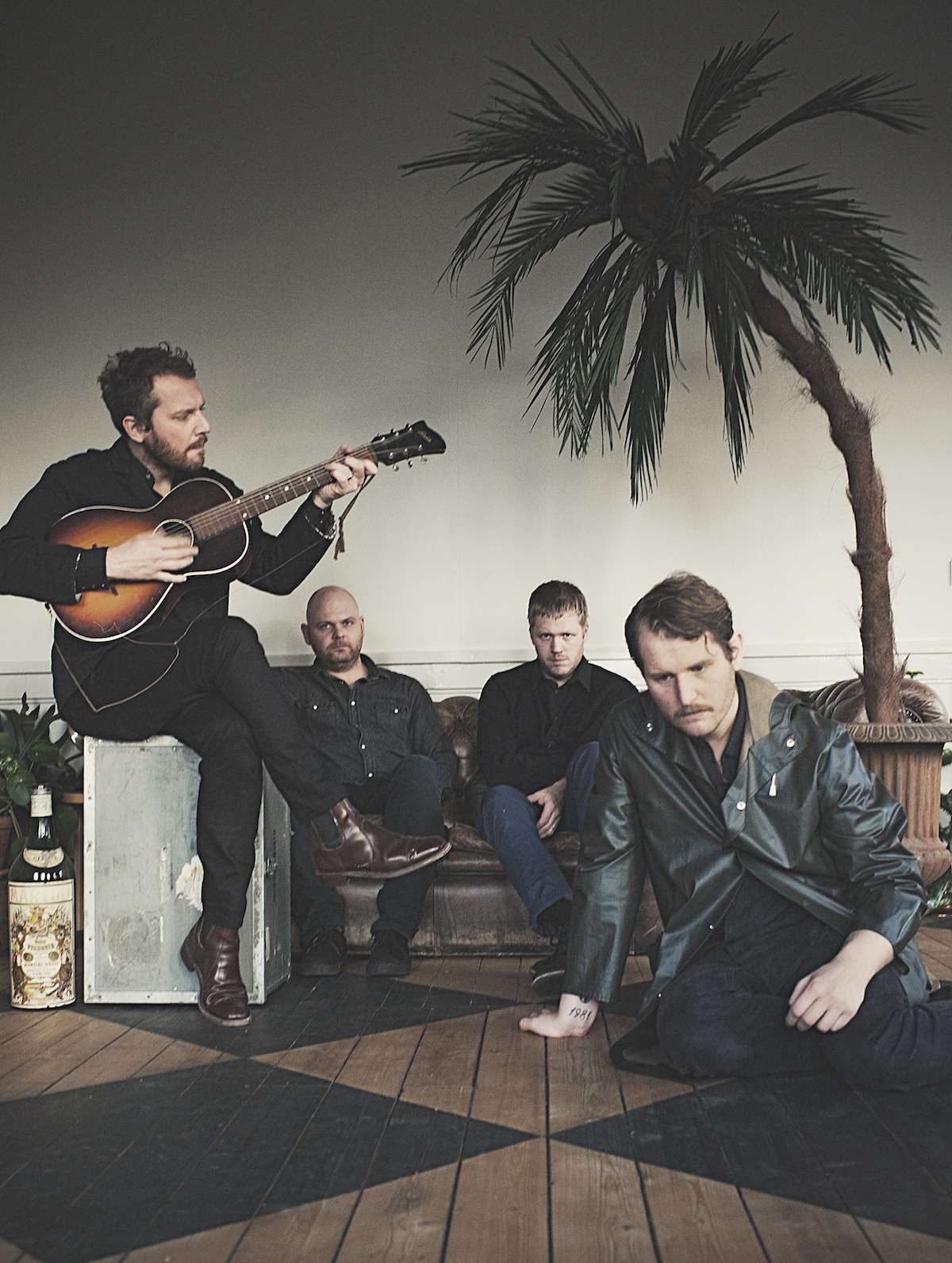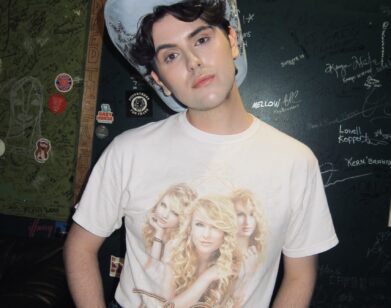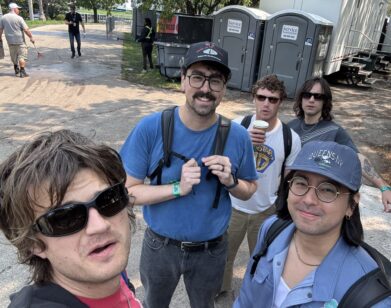The Mary Onettes Warm Up

ABOVE: THE MARY ONETTES
Over their past two albums (2007’s self-titled debut and 2009’s Islands), The Mary Onettes have compacted stadium-sized heartache into a darkly theatrical package. Theirs is a heady blend of shimmering 1980s hooks and ennui-drenched vocals likely to leave fans rummaging though memory banks for reference points (Is that Ocean Rain? Or merely a nod to Joy Division?), and bathroom cupboards for remnants of their Robert Smith-approved eyeliner.
So what’s a band with a signature sound to do after going dark for a few years? Why not hire Studio’s Dan Lissvik to spark both arguments and audio adjustments during the recording of album number three? “When I believe in something I really fight for it,” admits lead Mary Onette Philip Ekström, summing up the Hit the Waves studio sessions in an uncharacteristically condensed sound bite. “I’m not an easy case.”
We caught up Ekström, who—on the cusp of his weekend and beer in hand—told us about shaking off the sophomore curse, learning to communicate with his producer, and why cozying up with the Swedish culture might be a tall order. He also provided us with an exclusive premiere of the alternate version of their recently released single “Evil Coast,” which you can stream below.

LAURA STUDARUS: With all the disasters that you experienced in conjunction with your second album Islands—a volcano eruption canceling your tour, a hard drive crash deleting your first attempt, and having files stolen—do you get nervous when you sit down to write a song?
PHILIP EKSTRÖM: It’s almost like some force wants me to stop doing music. [laughs] There’s some kind of ghost that’s following me around that destroys my hard drives and makes volcanoes happen. I always do a lot of backups. Maybe too many backups nowadays.
STUDARUS: Do you believe in the idea of luck or fate—or, I guess in your case, bad luck?
EKSTRÖM: I believe that if you want something and you fight for it, it will somehow pay off. I believe in that, and I believe that there is a force—how do I put it—a strong energy. Creating music, it’s almost like you’re not doing music yourself, the music is doing you. It’s a strong energy that I really really believe in, almost in a religious way.
STUDARUS: Given how connected you are to your music, was it difficult to bring in Dan Lissvik to produce Hit The Waves?
EKSTRÖM: Yeah, it was kind of difficult because I’m really a control freak. It was really difficult to have someone telling you that some of the stuff you do is not good, or that they are good. It was tough. But when I believe in something I really fight for it. I’m not an easy case.
STUDARUS: So after two albums of doing everything yourself, why decide to bring in an outside producer?
EKSTRÖM: Because I felt that The Mary Onettes had been away for a while. We didn’t know if people waited for us, or people had forgotten about us. But I strongly believe that we cannot draw a limit to what we do. I really feel that we had to open our minds to do something totally different. That would probably make us a better band in many ways. Bringing in an outside producer would probably make that process easier, to have someone who comes from reggae or hip-hop almost. I felt that I don’t want to do one thing. I don’t want to have one sound. I want to have 50 sounds that I’m working with. That’s why. It was also a way of letting go of your control. Sometimes I believe that you have to do that to move on from what you’ve done before.
STUDARUS: It sounds healthy and terrifying.
EKSTRÖM: Yeah! [laughs] That’s true. We had a lot of fights in the band and with our producer. When you look back now, you realize that those fights, they were a good thing.
STUDARUS: How was that process, teaching each other how you communicate, and communicating your ideas to someone who hasn’t been with you the past two records?
EKSTRÖM: We were just throwing ourselves into the hands of a guy who is really, really difficult to work with. He doesn’t care about our past. He doesn’t care about our future. We thought that would be a really good thing. He didn’t understand us. He didn’t care about what’s going to happen or what we had done before.
STUDARUS: He was very much in the present tense.
EKSTRÖM: Yeah. I can understand. As a producer it’s a hard job, working with four guys with a strong will!
STUDARUS: Was the Love Forever EP recorded at the same time as this album? Or was that a separate project?
EKSTRÖM: That was a separate project. That was the start of the project, you can say. The EP, we had no control over what we were doing. It was about finding out what Dan would do for our sound. He was in charge all the way for the EP. But the album, we told him that we had to have more control and that the process would have to be different from working on the EP. First he said no, and then he said yes because we had money.
STUDARUS: How similar is the album to the EP?
EKSTRÖM: It’s four songs on the EP, and only two of them were produced by Dan. The two last songs were produced by me. Those two last songs are more similar to what the LP is like. I think it’s more Mary Onettes. What we sounded like before. But in a slightly different way. When we were doing the EP, he wanted to commercialize us in a way that we didn’t like at all. So we said to him that we had to go back to not doing that.
STUDARUS: The press release mentions Whitney Houston as an influence. I think people are either going to say that that’s a gusty or a kitschy choice.
EKSTRÖM: First I didn’t see that the record label had written her name in the press release. I missed that. I guess they wanted to have something that gets people’s attention. I mentioned that I had been listening to her first album because I like a lot of the synthesizers and the drum machines that she was using at that time. But it’s not like I’ve been influenced by her music so much.
STUDARUS: You’re not out doing “Greatest Love of All” at karaoke.
EKSTRÖM: No. [laughs]
STUDARUS: I feel like in the past couple of years, it’s changed—we don’t have to discuss her production and add the addendum, “as a guilty pleasure.”
EKSTRÖM: That’s a great thing, I believe, because you’re not afraid anymore. People can do whatever they want, musically, and get away with it. Because that’s probably a natural process in music. It has to be that way, to find new ways.
STUDARUS: I’m looking at some titles from your catalogue: “Hit The Waves,” Islands, “Evil Coast.” Does water imagery have a particular significance to you?
EKSTRÖM: When I wrote many of the songs, I was down on the west coast of Sweden, where my mother has a house. I was going down there last summer and wrote a lot of the songs there. I guess I was influenced by the environment around me at that time. It was not like I was thinking that this is a beach record or anything. I’ve always been influenced by nature. If you look at the Mary Onettes, we also refer to the forest or the sky. It’s always some kind of nature around us.
STUDARUS: Do you think that comes from the fact you can’t enjoy nature year-round?
EKSTRÖM: Yeah. Maybe. We have beaches as well—all the year. It’s just that you can’t swim in the ocean. We have a lot of beautiful places that could actually be almost as nice as where you live in LA. [laughs]
STUDARUS: I think being in Los Angeles might drive you crazy. We can be somewhat apathetic about our beaches this time of year.
EKSTRÖM: Well, I like the seasons here. It’s nice thing. It’s really cold outside today. It’s the first really cold day. It’s cool.
STUDARUS: I imagine my definition of cold and your definition of cold are probably very different. Anyway. When you write, you don’t seem afraid to tackle difficult topics. I’m thinking in particular of your last album, Islands. Do you find that writing can be cathartic, or is it a bit of a painful process?
EKSTRÖM: Of course it’s a bit painful. I remember when I did Islands. It was almost like I was embarrassed for the lyrics when I would play them for friends. It has to be painful, I think, because if you want to say something, it’s painful, many times. Not always. But I like to write about things that really mean something. What else would I be writing about? That’s what I’m thinking. It’s hard for me to write about nice weather or something—even if I refer to “Hit the Waves” and stuff like that. But that’s the very nice thing about that song. It’s not about hitting the waves at all. It’s a metaphor about social waves in society, how you have to go with the flow.
STUDARUS: It’s nice to know that the tradition of writing about what’s on your mind and heart is continued on this new album.
EKSTRÖM: Yeah, I think so. Maybe in a more almost political way. It’s much more about the Swedish way of being, somehow. How the society is not a very warm society. It’s deep stuff.
STUDARUS: I hear from a lot of people that the Swedish society isn’t very warm. Yet I’ve had so many experiences in Sweden that would make me believe otherwise.
EKSTRÖM: I think it goes deeper. We’re friendly people, I think. But that’s something different. We can talk to people and be friendly, but there is something really, really deep inside us where we have difficulties really caring about each other. Solidarity. Is that something that you can say? People are really individualistic. People always care about themselves more than others.
STUDARUS: Within the Swedish music scene, do you find that there’s more of an emphasis on personal success in art or monetizing your music?
EKSTRÖM: That’s a tough question, I think. Doing something really well often gives you commercial success in the end. [laughs] I think we’re very ambitious. That’s the most important thing, I think. To do it really good. I think it’s more important to do it really well than to make money.
When we came to the US for the first time, people asked us “Where’s your manager?” “Where’s your publicist?” “Where’s your blah, blah, blah.” We were like, “We don’t need that.” We do this in our way; we do it kind of, maybe, slow. It’s not important to happen right away. We have to build something up from the start. We are stubborn people.
STUDARUS: Do you feel like if you had instant success when you first started releasing music, that would have been something that you could have handled?
EKSTRÖM: When we released our first album in 2007, a lot of people started to like us very fast. I was pretty happy about the way it was growing. Not too fast. It probably would have been very difficult for us if it had been an instant commercial success and we sold a lot of albums. I feel like we don’t have success to measure ourselves with our own success all the time. So we can take our time and do really good albums instead of, “Oh, we’ve got to put out a single to make some cash!” That would probably destroy us. That’s probably why a lot of bands suck in the end.
STUDARUS: With some of the titles on this new album, “Unblessed,” “Can’t Stop the Aching” “Don’t Forget (to Forget About Me).” Do you consider yourself to be more of an optimist or pessimist?
EKSTRÖM: Both at the same time. Where I come from, in my family and all that, we’re pessimists, I think. But I’m optimistic when it comes to making music, actually. Where I want to go with my music. I’m probably pessimistic in my daily life. In Sweden, we’re typically anxious. We always, always, always want something better. The grass is greener. That’s a big problem for us. That makes people really unhappy I think, wanting things to be better all the time. I try to be happy with what I’ve achieved. But I would probably be more happy if I knew what I would be achieving.
THE MARY ONETTES’ NEW SINGLE, “EVIL COAST,” IS OUT NOW. THEIR THIRD FULL-LENGTH, HIT THE WAVES, WILL BE RELEASED ON MARCH 12 VIA LABRADOR RECORDS. FOR MORE INFORMATION ABOUT THE BAND VISIT THEIR FACEBOOK PAGE.






